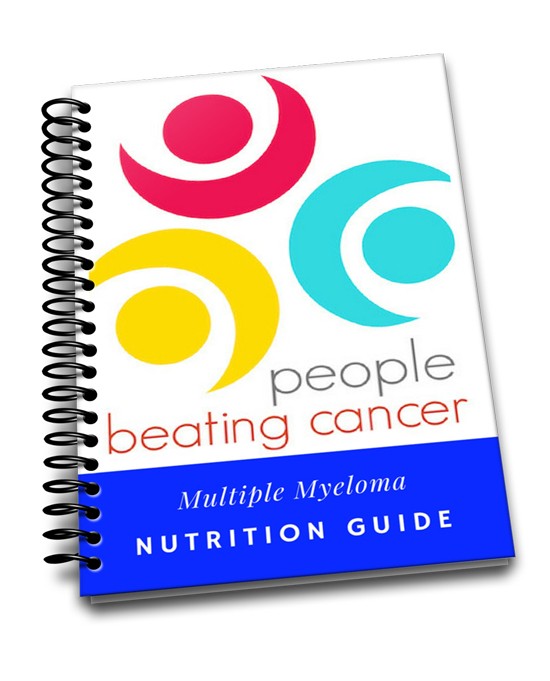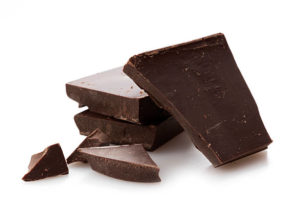
Recently Diagnosed or Relapsed? Stop Looking For a Miracle Cure, and Use Evidence-Based Therapies To Enhance Your Treatment and Prolong Your Remission
Multiple Myeloma an incurable disease, but I have spent the last 25 years in remission using a blend of conventional oncology and evidence-based nutrition, supplementation, and lifestyle therapies from peer-reviewed studies that your oncologist probably hasn't told you about.
Click the orange button to the right to learn more about what you can start doing today.
- You are here:
- Home »
- Blog »
- Healthy Living Products »
- Multiple Myeloma Survival- Dark Chocolate, Heart, Brain, MM
Multiple Myeloma Survival- Dark Chocolate, Heart, Brain, MM

“Studies of subjects who increased their daily intake of flavonoids from chocolate found that their LDL-cholesterol levels dropped, their blood vessels relaxed, and blood-clotting tendencies were diminished”
Multiple Myeloma survival- preventing MM relapse, managing heart, blood and brain health are my top priorities- health-wise. The challenge is managing all these issues day-in and day-out for years. My point is that living with MM and associated side effects requires a lifetime of effort.
My point is that you’ve got to find therapies that support multiple myeloma survival while still enjoying yourself. I think dark chocolate is one such therapy.
My cancer, multiple myeloma, is considered to be incurable and I have chronic atrial fibrillation (A-Fib)- chemo-induced heart damage. I have been MM free since ’99 and I have lived with chronic A-fib since 11/10.
Could my daily dark chocolate habit be one of the reasons for my long-term health? While I can’t say that daily dark chocolate is the sole reason for my health, it certainly helps.
While it’s fun to think that dark chocolate is good for you, it’s more important to try to figure out why it’s good for you (me). I recommend watching Dr. Bill Li’s Ted Talk, citing the anti-angiogenic benefits of dark chocolate. Boy did my ears perk up when Dr. Li talked about eating maintenance chemotherapy daily. In addition to dark chocolate, I supplement with curcumin, green tea extract, resveratrol and milk thistle.
My dark chocolate of choice is Endangered Species Chocolate Natural Dark Chocolate with 88% Cocoa. Cosumerlab.com, an independent testing service, tested and approved ESCNDC and found it to have the lowest cost per 200mg of flavanols.
As Dr. Bill says, Dark Chocolate is “daily non-toxic chemotherapy…”
I am both a cancer survivor and cancer coach. For more information about natural therapies for cancer or heart disease, scroll down the page, post a question or comment and I will reply ASAP.
Thank you,
David Emerson
- MM Survivor
- MM Cancer Coach
- Director PeopleBeatingCancer
Recommended Reading:
Cocoa Flavanol (dark chocolate) for skin, heart and brain health
Cancer protective properties of cocoa: a review of the epidemiologic evidence.
“Due to their high concentration of catechins and procyanidins, bioactive compounds with distinct properties, cocoa and chocolate products may have beneficial health effects against oxidative stress and chronic inflammation, risk factors for cancer and other chronic diseases…”
True or False: Eating Dark Chocolate Can Lower Your Risk of Cancer and Cardiovascular Disease
“Cocoa and dark chocolate are rich in flavonoids and antioxidants, chemical compounds that help protect against the harmful products of oxygen reactions (know as “free radicals”) in body tissues. These free radicals have been linked to the development of heart disease and some cancers .
Antioxidants have also been shown to lower LDL cholesterol, the so-called “bad” cholesterol.
Studies of subjects who increased their daily intake of flavonoids from chocolate found that their LDL-cholesterol levels dropped, their blood vessels relaxed, and blood-clotting tendencies were diminished…”
“We are rating foods based on their cancer-fighting qualities,” Li said. “What we eat is really our chemotherapy three times a day.”
“We are rating foods based on their cancer-fighting qualities,” Li said. “What we eat is really our chemotherapy three times a day.”
“We are rating foods based on their cancer-fighting qualities,” Li said. “What we eat is really our chemotherapy three times a day.”
Dark Chocolate- Flavanols for Cancer Prevention, Heart and Brain health
The present systematic review suggests that the dietary intakes of six classes of flavonoids, namely flavonols, anthocyanidins, proanthocyanidins, flavones, flavanones and flavan-3-ols, significantly decrease the risk of CVD
Cancer patients and survivors know that trying to “eat right” after a cancer diagnosis can be difficult. Especially if you have a sweet tooth. While I haven’t completely eliminated all sugar from my diet I have been able to almost completely eliminate processed sugars and have reduced many other forms of natural sugars. I will consume a small amount of sugar however, if it means eating 200 mg of flavanols at one time.
Why do I care about flavonols so much?
- I am a cancer survivor working to remain cancer-free.
- I have chronic A-Fib and
- I have chemobrain.
I try to keep my heart and brain as healthy as possible.
The benefits of flavonoids:
- – flavonoids help prevent cancer or a cancer relapse
- – flavonoids decrease the risk of cardiovascular disease (CVD)
- – flavonoids may decrease memory decline.
Most importantly, dark chocolate bars taste really good. As a 25 plus year cancer survivor, I know to eat well. And sometimes I need to eat something sweet and satisfying. Enter dark chocolate.
According to ConsumerLab.com® “”…lowest in cost to get flavonols was Endangered Species Natural Dark Chocolate with 88% cacao. It provided 11 mg of Flavanol per gram and the cost to obtain 200 mg of flavanols was 53 cents.”
Recommended Reading:
- Organic Diet-Fewer Cancer Dx’s, Longer Cancer Survival
- Curcumin vs. Multiple Myeloma: The scientific evidence continues to pile up
- Cancer Coaches Help Guide Multiple Myeloma Patients-
Flavonoids and cancer prevention: a review of the evidence.
“A limited number of intervention trials of flavonoids have documented cancer preventative effects. Proposed anticancer mechanisms for flavonoids are inhibition of proliferation, inflammation, invasion, metastasis, and activation of apoptosis…”
Flavonoid intake and risk of CVD: a systematic review and meta-analysis of prospective cohort studies.
” The present systematic review suggests that the dietary intakes of six classes of flavonoids, namely flavonols, anthocyanidins, proanthocyanidins, flavones, flavanones and flavan-3-ols, significantly decrease the risk of CVD.”
“Age-related memory decline may be reversed with high doses of naturally occurring cocoa flavanols, US researchers have discovered in findings that establish the dentate gyrus as central to cognitive decline.
“Together, these results provide evidence that age-related changes in the DG [dentate gyrus] observed in aging humans underlie and drive a hippocampal-dependent component of cognitive aging,” the investigators write…” (Medscape)”
The neuroprotective effects of cocoa flavanol and its influence on cognitive performance
“Cocoa powder and chocolate contain numerous substances among which there is a quite large percentage of antioxidant molecules, mainly flavonoids, most abundantly found in the form of epicatechin. These substances display several beneficial actions on the brain…”
“Cocoa flavanol consumption improves cognitive function, blood pressure control, and metabolic profile in elderly subjects”
Dentate gyrus, high flavanol intervention, cognition? Why can’t researchers just tell us what we want to know? The point of the study linked and excerpted below is that flavanol rich dark chocolate helps the aging brain work better.
I started eating dark chocolate because I watched a Ted Talk where the speaker referred to it “daily non-toxic chemotherapy.” I’m a cancer survivor who wants to stay cancer-free. In addition, I read an study explaining that dark chocolate is heart-healthy. Thank you Dr. Bill Li.
Consumerlab.com, an independent testing service found Endangered Species Chocolate Natural Dark Chocolate with 88% Cocoa to be the lowest-cost dark chocolate per 200 mg of flavanols. ESCNDC is now my brand of dark chocolate.
ConsumerLab.com Flavenol/Dark Chocolate Report (must be a member to read)-
Yes, milk chocolate is sweeter than dark chocolate. However, dark chocolate has less cocoa butter and is a lot less fattening. I’ve been eating dark chocolate for awhile now and I find it satisfying- I find milk chocolate to taste too sweet.
I am both a cancer survivor and cancer coach. For more information on natural therapies to increase cognitive function, scroll down the page, post a question or comment and I will reply ASAP.
Thank you,
David Emerson
- Cancer Survivor
- Cancer Coach
- Director PeopleBeatingCancer
Enhancing dentate gyrus function with dietary flavanols improves cognition in older adults.
“The dentate gyrus (DG) is a region in the hippocampal formation whose function declines in association with human aging and is therefore considered to be a possible source of age-related memory decline…
A high-flavanol intervention was found to enhance DG function, as measured by fMRI and by cognitive testing. Our findings establish that DG dysfunction is a driver of age-related cognitive decline and suggest non-pharmacological means for its amelioration.”
Cocoa flavanol consumption improves cognitive function, blood pressure control, and metabolic profile in elderly subjects: the Cocoa, Cognition, and Aging (CoCoA) Study—a randomized controlled trial1,2,3,4
“Background: Recent evidence has indicated that flavanol consumption may have many health benefits in humans, including improved cognitive activities.
Objective: The aim was to evaluate the effect of flavanol consumption on cognitive performance in cognitively intact elderly subjects…
Conclusions: This dietary intervention study provides evidence that regular CF consumption can reduce some measures of age-related cognitive dysfunction, possibly through an improvement in insulin sensitivity. These data suggest that the habitual intake of flavanols can support healthy cognitive function with age…”



